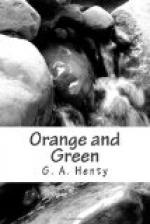In Scotland, the Jacobite party were numerous and powerful, and were in open rebellion to his authority. Thus, then, if William’s position on the throne of England was to be consolidated, it was necessary that a blow should be struck in Ireland.
Torn by dissension, without plan or leading, the Irish army remained, for months, inactive; most of the regiments having, after the northern campaign, returned to the districts in which they were raised; and thus, no preparation was made to meet the army which was preparing to invade the country.
This, ten thousand strong, under the command of General Schomberg, who, although eighty years of age, was still an able, active, and spirited commander, embarked on the 8th of August at Chester, and on the 13th landed near Bangor, in Carrickfergus Bay. There was no force there of sufficient strength to oppose him.
Schomberg found Antrim and Belfast deserted; but the garrison at Carrickfergus, consisting of two regiments, prepared vigorously for a siege. Schomberg at once prepared to invest it, and in a short time attacked it by land and sea. The siege was pressed with vigour, but the garrison, under M’Carty Moore, defended themselves with the greatest skill and bravery. As fast as breaches were battered in their walls, they repaired them, and repulsed every attempt of the besiegers to gain a footing in the town. The garrison were badly supplied with ammunition, but they stripped the lead from the roofs of the castle and church to make bullets.
But all this time, no attempt whatever was made to relieve them. The French and Irish generals were disputing as to what was the best plan of campaign. The king was busy making money with his trade with France; and, after holding out until they had burned their last grain of powder, the gallant garrison were forced to capitulate. Schomberg was too glad to get the place to insist on hard terms, and the garrison marched out with all the honours of war—drums beating, and matches alight—and were conveyed, with all their stores, arms, and public and private property, to the nearest Irish post.
The effect of this determined resistance, on the part of the little garrison at Carrickfergus, was to impress Schomberg with the fact that the difficulty of the task he had undertaken was vastly greater than he had supposed. The success with which Londonderry had defended itself against the Irish army had impressed him with the idea that the levies of King James were simply contemptible; but the fighting qualities of the garrison of Carrickfergus had shown him that they were a foe by no means to be despised, and convinced him that the force at his command was altogether inadequate to his necessities.
He therefore moved south with extreme caution. He found the country altogether wasted and deserted. The Protestants had long since fled, and were gathered round Derry and Enniskillen. The Catholics had now deserted their homes, at his approach; and the troops, in their retreat, had burned and wasted everything, so that he had no means of subsistence for his army, and was obliged to rely upon the fleet, which he ordered to follow him down the coast.




